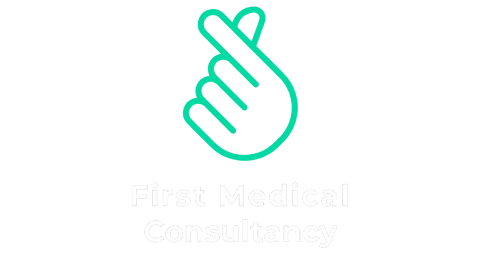As I begin on my own medical career in the Gulf Cooperation Council (GCC) countries, I’ve come to realize that the allure of lucrative opportunities and professional growth can quickly turn into frustration when faced with the complex application processes for healthcare authorities.
The numerous eligibility criteria, varied examination formats, and extensive documentation requirements can feel like navigating a maze. But I’ve learned that with the right guidance, these challenges can be overcome.
In this guide, I’ll share my insights and practical tips to help you successfully navigate the licensing procedures and take the next step in your medical career in the GCC with confidence.
Key Takeaways:
- Understand the authorities: Familiarize yourself with the GCC healthcare authorities, including DHA, DOH, MOH, QCHP, SCFHS, Oman, Bahrain, and Kuwait, and their roles in healthcare licensing.
- Be aware of common complexities: Recognize the common challenges in the application process, such as varied eligibility criteria, differences in examination formats, and extensive documentation requirements.
- Know the specific requirements: Understand the detailed requirements for each authority, including eligibility criteria, application steps, and examination details.
- Prepare strategically: Organize your documentation efficiently, prepare for examinations strategically, and understand regional regulations to overcome application challenges.
- Seek professional guidance: Consider utilizing professional consultancy services like First Medical Consultancy to streamline the process and increase your chances of success.
Understanding the GCC Healthcare Authorities

For healthcare professionals looking to practice in the Gulf Cooperation Council (GCC) countries, understanding the various healthcare authorities is crucial.
These authorities play a vital role in regulating the healthcare industry, ensuring that only qualified professionals are licensed to practice.
Overview of the Authorities’ Roles
With the GCC countries comprising the United Arab Emirates (UAE), Qatar, Saudi Arabia, Oman, Bahrain, and Kuwait, each country has its own healthcare authority responsible for overseeing the licensing process.
These authorities include the Dubai Health Authority (DHA), Department of Health Abu Dhabi (DOH), Ministry of Health UAE (MOH), Qatar Council for Healthcare Practitioners (QCHP), Saudi Commission for Health Specialties (SCFHS), Oman Medical Specialty Board (OMSB), and National Health Regulatory Authority (NHRA) Bahrain.
Each authority has its unique role, responsibilities, and requirements, which can be overwhelming for applicants to navigate. In my experience, understanding the specific roles and responsibilities of each authority is critical to ensuring a smooth application process.
For instance, the DHA is responsible for regulating healthcare services in Dubai, while the DOH oversees healthcare services in Abu Dhabi. Similarly, the MOH is responsible for licensing healthcare professionals in the UAE, excluding Dubai and Abu Dhabi.
Key Regulations and Standards
Between the various GCC healthcare authorities, there are differences in regulations, standards, and requirements. It’s crucial to familiarize yourself with these differences to avoid any potential hurdles in the application process.
For example, the QCHP has specific requirements for qualifications and experience, while the SCFHS has a unique examination structure. Overview of the key regulations and standards reveals that each authority has its own set of rules and guidelines.
For instance, the OMSB has specific licensing exams, and the NHRA Bahrain has clinical experience requirements. Understanding these regulations and standards is vital to ensuring that your application meets the necessary criteria.
It’s worth noting that failure to comply with these regulations and standards can result in delayed or rejected applications. Therefore, it’s crucial to stay informed and up-to-date on the latest requirements and changes.
Common Complexities in the Application Process

If you’re considering a medical career in the GCC, you’re likely aware of the numerous complexities involved in the application process.
As someone who has navigated this journey, I’ve identified several common challenges that healthcare professionals face when applying to GCC healthcare authorities.
These complexities can be overwhelming, but understanding them is the first step to overcoming them. In this section, we’ll probe into the common complexities that you may encounter during the application process.
Language Barriers and Cultural Differences
For many healthcare professionals, language barriers and cultural differences can be significant obstacles in the application process.
Arabic is the official language in most GCC countries, and proficiency in the language is often a requirement for licensure. Moreover, cultural nuances and differences in communication styles can lead to misunderstandings and miscommunications.
Failing to address these barriers can result in delayed or rejected applications. It’s imperative to be aware of these differences and take steps to overcome them, such as enrolling in language courses or seeking guidance from a professional consultancy like First Medical Consultancy.
Documentation Requirements and Authentication
Along with the language barriers, documentation requirements and authentication processes can be another significant hurdle in the application process. The GCC healthcare authorities require a vast array of documents, including academic transcripts, certificates, and proof of experience.
Incomplete or inaccurate documentation can lead to application rejection. It’s crucial to ensure that all documents are properly authenticated and translated, if necessary. Moreover, understanding the specific documentation requirements for each authority is vital to avoiding delays and rejections.
Language plays a critical role in the documentation process, as documents may need to be translated into Arabic. Additionally, the authentication process can be time-consuming, and it’s imperative to plan accordingly to avoid last-minute rush.
Detailed Requirements for Each Authority

Now that we’ve discussed the common complexities in the application process, let’s dive deeper into the specific requirements for each GCC healthcare authority. It’s crucial to understand the unique needs of each authority to ensure a smooth and successful application process.
As a healthcare professional, you may be interested in exploring opportunities with the best nurses recruitment agency for GCC | Concise International, which can provide valuable guidance and support throughout your journey.
Ministry of Health (MOH) Requirements
After reviewing the general requirements for MOH, you’ll need to ensure you meet the specific eligibility criteria, which include a minimum of two years of experience in your specialty and a valid medical license from your home country.
Additionally, you’ll need to provide detailed documentation, including your medical degree, transcripts, and proof of experience. It’s strongly recommended that you verify the authenticity of your documents through the relevant authorities, such as the Ministry of Foreign Affairs or the Embassy of your home country, to avoid any delays in the application process.
Dubai Health Authority (DHA) Requirements
On the other hand, DHA has its own set of requirements, which include a minimum of two years of experience in your specialty and a valid medical license from your home country or country of last practice. You’ll also need to pass the DHA exam, which assesses your knowledge and skills in your chosen specialty.
Requirements for DHA also include a thorough evaluation of your credentials, including your medical degree, transcripts, and proof of experience. Make sure you have all the necessary documents ready and translated into Arabic, if required, to avoid any delays in the application process.
Health Authority Abu Dhabi (HAAD) Requirements
For HAAD, you’ll need to meet the eligibility criteria, which include a minimum of two years of experience in your specialty and a valid medical license from your home country or country of last practice.
You’ll also need to pass the HAAD exam, which assesses your knowledge and skills in your chosen specialty. Even if you have extensive experience, don’t assume that you’ll automatically qualify for HAAD.
Ensure you review the specific requirements and eligibility criteria carefully to avoid any surprises during the application process.
Tips to Overcome Application Challenges
To ensure a smooth and successful application process, it’s crucial to be aware of the common complexities and take proactive steps to overcome them. Here are some valuable tips to help you navigate the challenges:
- Organize your documentation efficiently, making sure all required documents are complete and up-to-date.
- Prepare strategically for examinations, familiarizing yourself with the format, content, and passing criteria.
- Understand regional regulations, recognizing the differences and similarities among the various GCC healthcare authorities.
- Utilize professional consultancy services, such as First Medical Consultancy, to streamline the process and avoid common pitfalls.
If you’re interested in learning more about the licensing process, I recommend checking out this comprehensive guide on How to Get Licensed as a GCC Healthcare Professional.
Preparing Thoroughly for the Application Process
Overcome the complexity of varied eligibility criteria and experience requirements by thoroughly researching the specific requirements for each authority.
This will help you identify any gaps in your qualifications or experience, allowing you to address them before submitting your application.
Take the time to review the application steps and necessary documents for each authority, ensuring you have all the required materials ready. This will save you time and effort in the long run, reducing the risk of delays or rejection.
Seeking Professional Guidance and Support
An expert consultancy like First Medical Consultancy can provide invaluable guidance and support throughout the application process. Their team of professionals has extensive knowledge of the GCC healthcare authorities and can help you navigate the complexities with ease.
Preparing for the application process can be overwhelming, especially when dealing with multiple authorities and varying requirements.
That’s why seeking professional guidance can make all the difference. With their expertise, you can ensure your application is complete, accurate, and submitted on time, giving you the best chance of success.
The Role of Professional Consultancy

Unlike attempting to navigate the complex application process alone, partnering with a professional consultancy can make all the difference in achieving your goal of practicing medicine in the GCC.
Benefits of Partnering with a Consultancy
One of the most significant advantages of working with a consultancy is the wealth of knowledge and experience they bring to the table.
With their expertise, you can rest assured that your application is in good hands, and you’ll receive guidance on the most effective way to present your credentials and experience.
Furthermore, a consultancy can help you avoid costly mistakes and delays, which can be detrimental to your application.
By leveraging their understanding of the intricacies of each healthcare authority’s requirements, you can ensure that your application is complete, accurate, and submitted on time.
How a Consultancy Can Simplify the Application Process
Along with the benefits mentioned above, a consultancy can also simplify the application process by breaking it down into manageable tasks, providing you with a clear roadmap to success.
They’ll help you gather the necessary documents, prepare for examinations, and ensure that you meet the specific requirements of your chosen healthcare authority.
Moreover, a consultancy can offer valuable insights into the cultural nuances and regional regulations that may impact your application, helping you to avoid potential pitfalls and increase your chances of success.
Another significant advantage of working with a consultancy is that they can help you develop a customized strategy tailored to your unique needs and circumstances. By understanding your strengths, weaknesses, and goals, they can provide personalized guidance and support every step of the way.
By partnering with a professional consultancy, you can significantly reduce the stress and uncertainty associated with the application process, and increase your chances of success in obtaining a license to practice medicine in the GCC.
Summing up
Conclusively, navigating the complexities of applying to GCC healthcare authorities requires a deep understanding of the intricacies involved.
As I’ve guided you through this comprehensive guide, I hope you now feel more confident in tackling the challenges that come with pursuing a medical career in the GCC.
Keep in mind, you’re not alone in this journey. With the right support and expert guidance, you can overcome the hurdles and achieve your goals.
If you’re ready to take the next step, I encourage you to reach out to First Medical Consultancy for personalized assistance. Their team of professionals is dedicated to helping healthcare practitioners like you succeed. So, don’t let the complexities hold you back – take the first step toward your exciting career in the GCC today!
FAQs
Q: What are the main GCC healthcare authorities that I need to be aware of when applying for a medical license?
A: The main GCC healthcare authorities that you need to be aware of when applying for a medical license are the Dubai Health Authority (DHA), Department of Health Abu Dhabi (DOH), Ministry of Health UAE (MOH), Qatar Council for Healthcare Practitioners (QCHP), Saudi Commission for Health Specialties (SCFHS), Oman Medical Specialty Board (OMSB), and National Health Regulatory Authority (NHRA) Bahrain.
Each authority has its own set of rules, regulations, and requirements that you need to fulfill to obtain a medical license.
Q: What are the common complexities that I may face during the application process for a GCC healthcare authority?
A: Some common complexities that you may face during the application process for a GCC healthcare authority include varied eligibility criteria and experience requirements, differences in examination formats and passing criteria, extensive documentation and credential verification, and limitations on exam attempts and re-training requirements.
These complexities can be overwhelming, but with the right guidance and support, you can navigate them successfully.
Q: How can I ensure that my application is successful, and what are some tips to overcome common challenges?
A: To ensure that your application is successful, it’s important to understand the specific requirements of each GCC healthcare authority, organize your documentation efficiently, prepare for examinations strategically, and understand regional regulations.
Additionally, consider seeking expert guidance from a professional consultancy like First Medical Consultancy, which can streamline the process and provide valuable insights to help you overcome common challenges.
Q: What role does a professional consultancy like First Medical Consultancy play in the application process, and how can they benefit me?
A: A professional consultancy like First Medical Consultancy plays a crucial role in guiding you through the complex application process for GCC healthcare authorities. They can provide expert guidance, streamline the process, and help you overcome common challenges.
By seeking their assistance, you can increase your chances of success, save time and effort, and gain valuable insights into the application process.
Q: What’s the next step after reading this guide, and how can I get personalized assistance for my application?
A: After reading this guide, the next step is to take action and start preparing your application. If you’re looking for personalized assistance, consider reaching out to First Medical Consultancy.
Their team of professionals is dedicated to helping healthcare practitioners like you achieve their goals with ease. Contact them today to discuss your application and take the first step toward your exciting career in the GCC!
